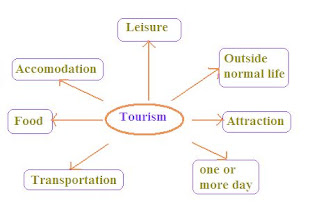The term 'tourist' is derived from the French word 'touriste', meaning traveller. Tourists may travel to visit historical sites, cultural attractions, natural wonders, recreational activities, and other points of interest. Travelers may choose to stay at hotels, inns, bed & breakfasts, hostels, resorts, campgrounds, lodges, or any other type of lodging establishment.
Tourism is defined as the practice of visiting places, especially destinations, often for leisure purposes. Tourism is a major industry in many countries around the world. In 2017, international tourist arrivals reached 1.4 billion people, a figure expected to reach 1.6 billion by 2030 (UNWTO).
Tourism can be defined as the conditioning of traveling, visiting a place as well as, sightseeing, and spending rest in a beautiful place outside the domestic area for one or further days.
The World Tourism Organization (WTO) states that tourism is the exertion of people who travel to places outside their customary surroundings and stay there for rest, business, or other purposes for no longer than one time without interruption.
- Tourism is a wisdom, an art, and a business
- Attracting callers
- Transporting them
- Accommodating them
- Catering to their requirements and wants
- All excursionists are trippers but all trippers aren't excursionists.
The Main Features of Tourism
- Tourism is considered to be a multi-billion dollar industry. According to the World Tourism Organization, tourism generated $9 trillion in 2016, accounting for 10% of the global GDP.
- Tourism is an important economic activity in many developing countries. In 2015, tourism contributed over 11 percent of the gross domestic product in the Philippines and was responsible for about 8 percent of employment in the country.
- Tourism is also an important source of income for some small island states. In the Pacific region, tourism contributes between 5–10 percent of GDP in Fiji, Kiribati, Nauru, Tuvalu, Palau, Solomon Islands, Tonga, Vanuatu, and Papua New Guinea.
- In addition to providing jobs and revenue, tourism also provides opportunities for social interaction and cultural exchange. Many tourists seek out unique experiences and authentic local culture.
- Tourism is not only popular among travelers, but also among locals. Local communities benefit economically from tourism, and they have developed their own unique forms of tourism.
- Many cities and towns have become famous for their festivals, events, and celebrations. These events attract visitors from all over the globe.
- Tourism is becoming increasingly popular in developing countries. As more people have access to the internet, they are able to research and plan trips online. Online booking platforms make it easier than ever before to book flights, accommodation, and tours.
- Tourism is now a multibillion-dollar business, and it continues to grow rapidly. There are many different types of tourism, and each offers its own set of challenges and rewards.
Categories of Tourism
- Destination and
- Niche.
Tourism is popular in which countries?
Read more:
* Perspectives of Tourism
* Types of Tourism
* Sustainable Tourism Sustainable Tourism.

